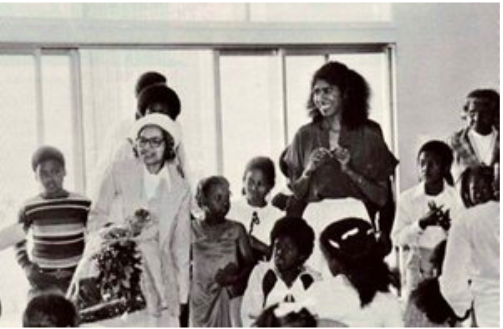This incredible interview spans Ericka Huggins’s lifelong commitment to activism, from her attendance of the March on Washington for Jobs and Freedom in 1963 to her work with the Black Panther Party and experiences as the director of OCS, and more recently to her work as a professor and advocate for the LGBTQ community and incarcerated people.
Higgins was also deeply involved in coalition building with other organizations such as the Young Lords, Brown Berets, the American Indian Movement, and the Third World Women’s Alliance. One example of Huggins’ coalition building work while she was director of OCS can be seen in her support of Centro Infantil, a preschool for predominantly Latinx students.
In this interview, Huggins discusses gender roles and inequality and how it was addressed at OCS, saying: “The reason why we end up raising children alone and like the women, for instance, of the Black Panther Party were not fully supported in taking care of their children was because men were socialized to think they had [no] responsibility. We brought that to the forum at the Oakland Community School. The men learned how to braid hair. The men changed the diapers for the little ones in the Child Development Center, the daycare, that was connected to the schools. The men could teach just as the women could teach. The men could cook. As a matter of fact, the heads of the kitchen were men. But if a woman came in and had more expertise, then she became the person who’d take the lead on the menus and so on.”
As for the children, Huggins says that “We told them, ‘You can do anything. Don’t let anybody tell you anything different.’ And we told the boys the same thing and we told the boys the same thing about the girls. It was a gender-neutral, race-neutral [and] sexual orientation-neutral campus. We did not affirm any, as we call them social constructs, as normal. There is no normal. And the children knew it.”
Essentially, Huggins expresses that at OCS, staff did not conform to gender role expectations, and students were not socialized to like certain activities or pursue certain careers based on gender, race, or sexual orientation.
Huggins also shares incredible stories of the visits of Maya Angelou, Rosa Parks, James Baldwin, and Cesar Chavez (among others) to the school. It would not do justice to these stories to paraphrase them–please hear the stories in Huggins’ own words by reading the attached interview.
